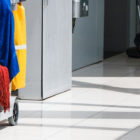
The cruise ship industry has been particularly hard hit by COVID-19’s rapid spread amongst passengers. For those who were unfortunate enough to deal with a ship-board quarantine, the fact that they would eventually be able to disembark and return to their homes helped them cope. But what if your home posed the same risks as a cruise ship environment?
Multifamily buildings and particularly high-rises are similar to stationary cruise ships: many have shared ductwork, common enclosed areas, and even food stations as part of an amenity program. Just as with a cruise ship, you’re sharing air, passageways and thousands of surfaces with hundreds of other people.
While most Florida boards know how to protect their community in the event of a hurricane or other natural disaster, managing a pandemic is uncharted territory. However, the same principles of governance and the business judgment rule apply. Conversations about how to minimize your residents’ potential exposure need to be occurring now.
Can we limit guests?
Unless your community is under quarantine, you cannot prevent owners from having guests visit them in their homes. Some of these guests may be necessary caretakers. However, you can ask your members to voluntarily reduce the number of guests they invite into the community and you can suspend the use of the common areas such as a clubhouse, pool or party room for private events hosted by owners. It is also reasonable to ask all guests to comply with the heightened sanitization protocol you’ve put in place including using hand sanitizers. It’s important to remember that the stakes are even higher in our “55 and Over” communities especially for those residents with underlying health issues. The federal and local governments have advised this demographic to stay off planes, cruises and away from large gatherings.
If you have guests entering the community because there is illegal short-term rental activity occurring now is the time to work with legal counsel to curb that activity. Airbnb can be a nuisance in some communities under ordinary circumstances but in the midst of a pandemic it makes it much harder to minimize exposure.
Lastly, some people such a census takers and process servers have a legal right to enter a private residential community. This does not mean, however, that these people have the unfettered right to access; the board can insist that those people don protective gear such as masks and gloves before entering. If your board decides to utilize this protocol then it makes sense to purchase these items to have them on hand.
Should we cancel or postpone our meetings?
In a community with a resident who has tested positive for COVID-19, the answer is yes, you should cancel or postpone a board or membership meeting in an abundance of caution unless the meeting pertains to an emergency. The larger your community the more likely it is that some of your members may be unaware that they are currently infected. It is important to take into account the purpose for the meeting when deciding whether or not to cancel or postpone. Holding the annual meeting when nothing is being presented to the membership for approval is not nearly as important as conducting the annual election. For vulnerable communities, the annual meeting could be canceled but the election should proceed. If online voting is not being used, owners can be instructed to drop off their ballots in a ballot box or in the association office and not attend the meeting in person. Intrepid owners can still attend to watch the opening and counting of the ballots so long as social distancing can be enforced (3 feet between persons). The goal is to minimize attendance so social distancing can be observed. Disposable gloves should be used to handle and open election materials since experts now warn that the virus can live on surfaces for days.
If possible, technology should be used to continue to conduct meetings which owners can attend from the safe comfort of their homes. Operating and administering the community must continue and meetings are a large part of that function.
What do we do if we find out one of our residents or employees has COVID-19 or has been exposed to the virus?
Boards need to work with association counsel to immediately determine what type of disclosure is appropriate and what kinds of policies regarding the common areas (lobby, corridors, elevators, etc.) need to be immediately implemented. Before any type of disclosure is made the board and legal counsel need to evaluate the credibility of the information. Self-reporting provides the most credible evidence but some residents and employees may be fearful of providing the association with that information. If a resident or employee has tested positive your board should work with the Department of Health on the appropriate disclosures and information to keep the virus contained.
Associations with direct employees should consider adding temporary PTO for sick days to encourage those employees to stay home at the first indication of illness. If the Association is aware that an employee has been exposed to the virus (i.e. recently took a cruise) then discussing with legal counsel your desire to pay that employee to stay home is warranted. Treating your employees humanely in this crisis will go a long way towards encouraging them to do the right thing by staying home and will further cement the relationship. Associations that have employees provided by a management company should discuss their expectations regarding PTO and employee coverage.
What should the board’s role be in this crisis?
Residents will be looking to the board and the building’s staff to take the proper steps to keep them safe. But residents also have an obligation to take steps to keep themselves and their neighbors safe and to heed the protocols being put in place by the board. Education, communication and strict adherence to thoughtful protocols will be key throughout the coming weeks. Boards need to identify reliable sources for information and establish channels through which official information will be disseminated to the residents. If the board has several methods of communication (website, FB page, email group, in-house cable channel, phone hotline, etc.) pick one which will be the official source so residents know to always go there for up to date information. In Florida, a significant number of owners may be headed back to homes up north. Boards need to understand that these owners will also want to be kept informed of developing circumstances whether they are in residence or not. If your board chooses to use a social media forum to inform and educate its members now is the time to republish the disclaimer and rules on that site. The board should not take on the task of providing medical advice and people posting on the site should be reminded that rumors and inaccurate information is neither welcomed nor permitted and will be removed.
Some boards find it difficult to work together on a regular basis. While discordant voices sometimes result in positive outcomes, now is the time for your board to work together in the midst of a health crisis. The management of this crisis will likely have significant short-term and long-term impacts on your community. The safety of your residents must be your paramount concern. COVID-19 may prompt boards to expand their emergency plans which were previously based on real property damage to include planning for a pandemic as well.
Florida’s Department of Health has a 24-hour helpline at (866) 779-6121 and our Firm has set up a webpage with links to a host of useful resources at Beckercovid19.com. When boards get pushback from their owners about new or changed policies, they need to be able to explain how they framed their decisions; relying upon assistance from experts provides a safety net for the board in this regard.






Recent Comments